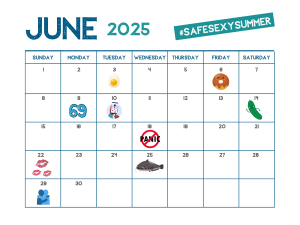
FDA Approves New Version of PrEP—Just Two Shots A Year
The FDA has approved lenacapavir as a form of pre-exposure prophylaxis (PrEP), offering a new option for HIV prevention requiring only two shots per year.

Consent is an agreement that is willfully given without any external pressure or factors. In order for someone to consent to sexual activity participants must continuously communicate—before, during, and after sexual activity
Communication is key—boundaries should be established before, during, and after sexual activity. In order for someone to consent to sexual activity participants must continuously communicate before, during, and after sexual activity—this is the only way to establish clear boundaries between participants and allows for a relaxing experience.
Consent does not always have to be verbal, but discussing boundaries, expectations, and consent between participants at each sexual encounter is the best way to avoid confusion and respect boundaries.
Sexual coercion is when someone pressures, uses drugs or alcohol, or forces sexual contact with a person against his or her will.
Sexual assault refers to sexual contact or behavior that happens without explicit consent of the victim.
When a friend or family member is sexually assaulted you may struggle to come up with ways to support them. The resources below provide guidance on how to navigate these situations and provide support without triggering and while respecting the victim’s privacy.
How do you know if someone wants to have sex? Or if they are unsure? What do these conversations around consent look like? This series of videos from Planned Parenthood helps demonstrate what clear communication around consent looks like.
See what you know about consent and coersion with these short quizzes developed for World Sexual Health Day, an annual celebration of sexual health on September 4.

The FDA has approved lenacapavir as a form of pre-exposure prophylaxis (PrEP), offering a new option for HIV prevention requiring only two shots per year.

On a recent episode of Love Island, a cast member sugested that we could blame our current STI epidemic on men who had sex with animals. She pointed to koalas with chlamydia as an example. There’s some truth here, but also a lot of misinformation.

A new report from the Centers for Disease Control (CDC) shows that we’re missing opportunities to prevent congenital syphilis and save lives.

Currently, condoms are the only widely available, proven method for reducing transmission of HIV and other sexually transmitted infections (STIs) during sex. Condoms work.

Anal sex may have once been thought of more taboo than other sexual behaviors, but today we know it’s a perfectly normal way to find sexual pleasure.

It’s time to celebrate the start of summer! June is filled with national observances to help you start the summer off right. We’re here to help make June the start of a #safesexysummer.

There’s potential good news in gonorrhea prevention as a series of studies suggests that certain meningococcal B (MenB) vaccines can reduce the risk of gonorrhea.

There is new guidance on pain management for IUD insertion and acknowledgement that providers often underestimate the pain patients feel during their procedures.
ASHA believes that all people have the right to the information and services that will help them to have optimum sexual health. We envision a time when stigma is no longer associated with sexual health and our nation is united in its belief that sexuality is a normal, healthy, and positive aspect of human life.
ABOUT
GET INVOLVED
ASHA WEBSITES
GET HELP
© 2025 American Sexual Health Association